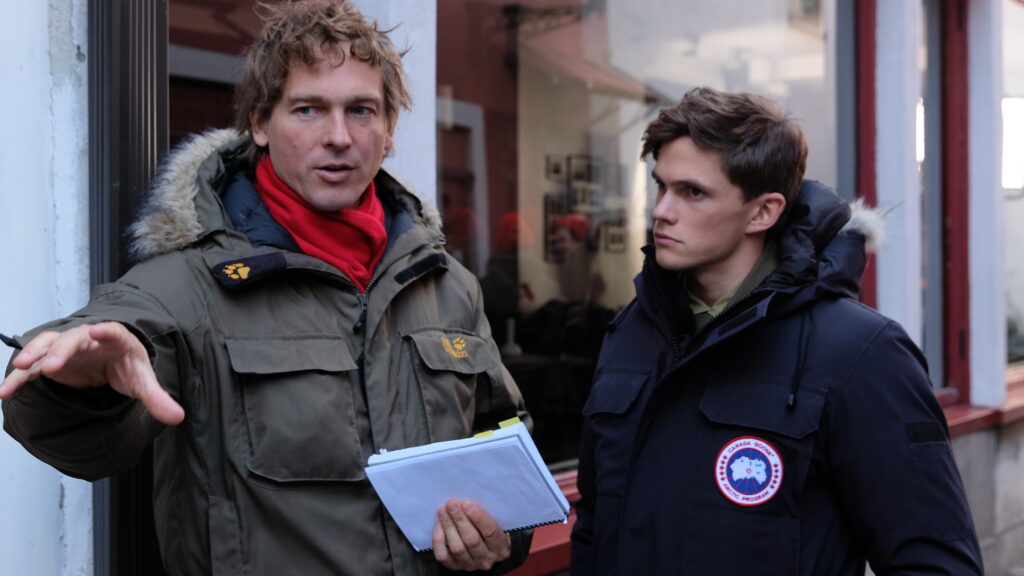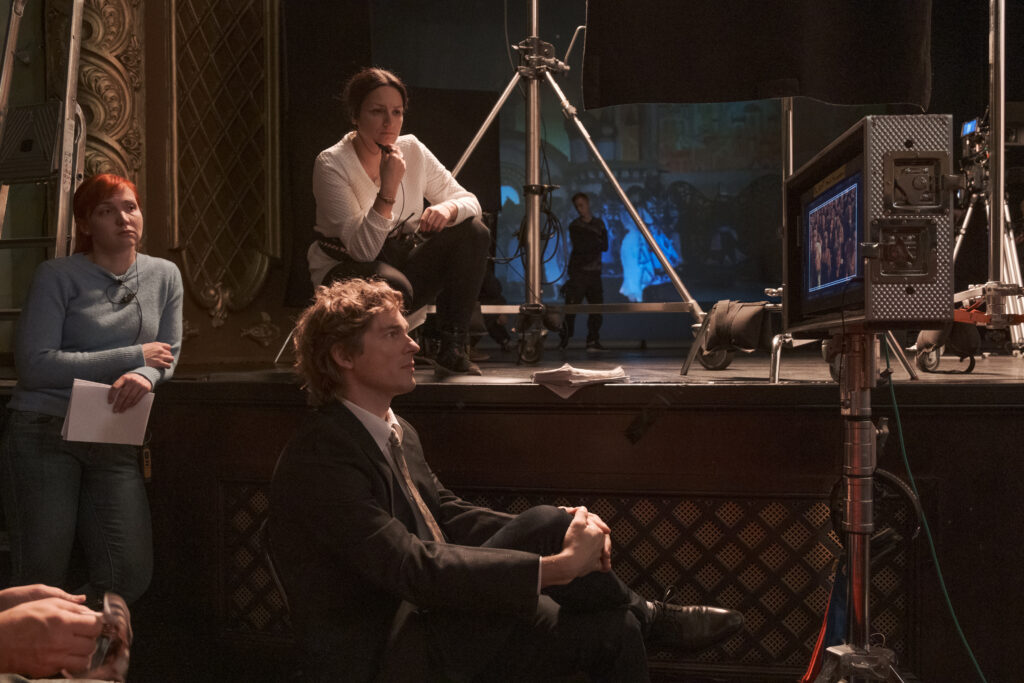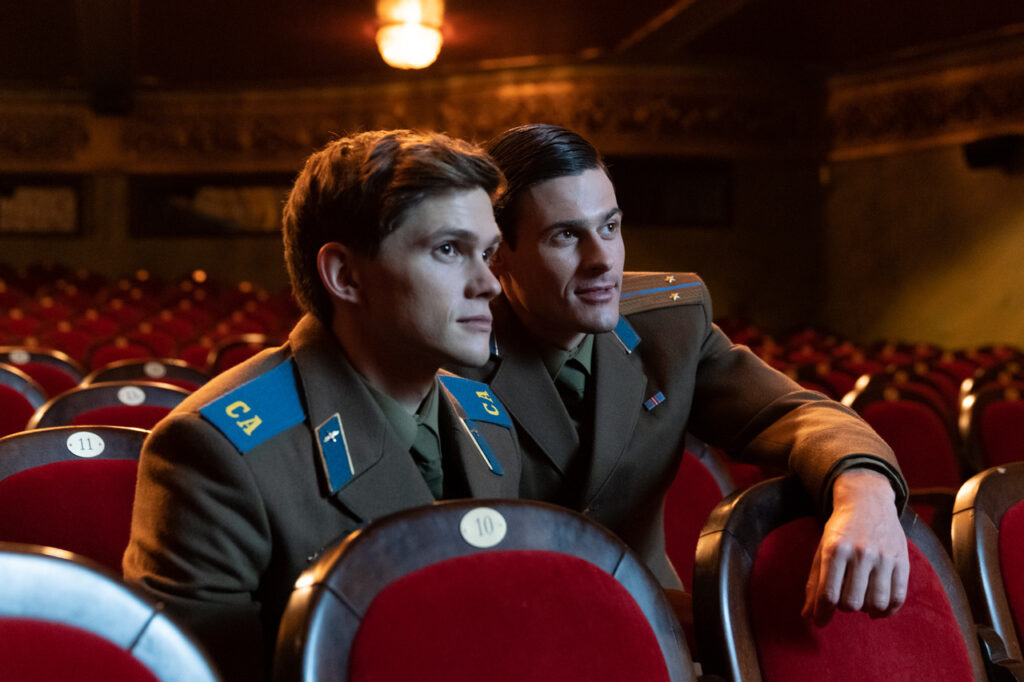Go behind the scenes of hit film, Firebird
Director Peeter Rebane opens up about sleeper hit LGBTQ film, Firebird.
Rebane’s Firebird has resonated quite strongly with audiences worldwide. The tragic queer love story between a Russian soldier, a fighter pilot and his soon to be wife on a military base in 1970s Soviet occupied Estonia cannot help but yield passionate responses from its viewers. Playing on the theme of forbidden love in the harshest of environments, Firebird shows us that love can flourish anywhere if its genuine.
Inspired by the movie and its themes, we sought out director Peeter Rebane to discuss the making of the film, the message behind it, and what comes next.
Spoilers ahead for those who have not yet seen the film.
Queer Forty (Q40): Hi Peeter! It is a pleasure to meet you. We really loved Firebird and so do our readers. The movie is clearly a labor of love. We understand that the film is based on Sergey Fetisov’s memoir A Tale About Roman whichwas first brought to your attention in 2011. What was it about Sergey’s story that inspired you to commit the next 10 years of your life to this project?
Peeter Rebane (PR): Well, the book was actually given to me at the Berlin Film Festival in 2011. My friend Tina was given the original autobiography to read, and she thought it would be of interest and passed it on to me. I read it over a weekend, and I literally cried. I knew I needed to turn this into a film.
It was, I think foremost, this amazing, simple, human love story in a very unique setting. Having grown up as young boy under the Soviet occupation in Estonia, and with our summer house near that very air force base, I almost didn’t believe it! I thought it wasn’t possible for this kind of a forbidden love story to have existed in the 1970s at the height of the Cold War. So that was intriguing.
I’d never seen a story told from that period of time and so I started researching. As we were writing together, Tom (Prior) and I, we met some other men who had served in the Soviet military at the time who had also fallen in love. We discovered this brand-new kind of subculture which I had no idea about before! People fell in love even at the toughest of times and they still do today which is amazing. That provided all the inspiration we needed to keep going. It’s been over 10 years now in the making and the movie is finally, finally available on demand around the world now.
Q40: Well, we’re sure glad you followed through on making this movie!
Why do you feel it’s important to tell this type of gay love story now? As opposed to one more reflective of modern times and gains in equality?
***Editor’s Note: This interview was conducted before the overturn of Roe v Wade on June 24 which stripped women of their federally protected reproductive rights and simultaneously established a fearful precedent in the Supreme Court that could be used to overturn marriage equality in the United States.
We decided to keep this part of the conversation in because Peeter’s comments help shine a light on non-Western countries worldwide where gay equality is not even a discussion yet.
PR: Sadly, I think the story is very reflective of modern times. Gains in gay equality only exist in a very small minority of western countries. We are lucky to live in this part of the world, with the UK and US having equal marriage laws. But the vast majority of the world is still discriminating, especially modern-day Russia. It is pretty upsetting to see the human rights violations overall with the Ukrainian war but, also the oppression of the queer community. I think Firebird is a very important story to tell now.
I’m often asked why does the movie have such a sad ending, but I feel like I can’t make a happy ending in my films until the real-life stories end happily in that part of the world. Until that time I think it’s important to shine a light on what’s still going on. It’s not just the Russia or Ukraine, but also Hungary with its new laws or Florida trying to ban drag shows. It’s pretty worrying.

Q40: You’re absolutely right. Thank you for pointing that out and making that distinction.
Now, switching gears a bit, a lot of gay films involving men in heterosexual marriages (Brokeback Mountain for instance) tend to ignore the feelings of the women involved but your film definitely showcases the effects that Sergey and Roman’s love affair had on Luisa. What made you want to tell and focus on this part of the story?
Also was Roman legitimately bisexual? It was clear he loved Luisa but was his desire for her real too? Or was it just a marriage of convenience to escape persecution?
PR: Luisa is probably the character we changed the most from the original story because Luisa was portrayed as a formidable alcoholic in the book. We felt that this might be Sergey looking back at his youth and blaming her for things. We really dug deep and tried to get more of a female perspective on this story, what it would have been like for her. Her fate is at least as tragic as Sergey and Roman’s because she never knowingly chose such a life and such a family for herself.
Now, regarding Roman being bisexual… I would leave up to the viewer really to make that decision. I have my ideas as the director, but I don’t want to bias the viewer or the audience. I do believe that he loved Louisa. I don’t think that Louisa was just an escape.
Q40: I’m glad to hear that. Can you elaborate on the significance of water in the film? A lot of key scenes and character realizations involve water. For me Sergey and Roman fall in love when they kiss by the rocks in the water. Sergey’s nightmares about his childhood friend/ boyfriend take place under the lake. When Roman decides to move in with Sergey in Moscow he is developing his photo in a pan of water. How does water connect these things and unify the story?
PR: The significance of water in the film really boils down to unplanned, intuitive choices. Tom actually was the one who chose to have one of the intimate scenes take place in the water. It just kind of happened while imagining the story and directing it.
We start with the lake at nighttime and we end with the frozen sea. For me, it metaphorically represents the development of Sergey’s feelings, but it wasn’t a calculated or logical choice. It’s really something that magically happened while writing, directing and editing the film. Quite a few people have asked about the theme of water and I can honestly say that when I made the film I didn’t have a theme of water consciously in my mind, it was a very subconscious process which is cool.

Q40: Very interesting! Amazing how that happens organically with the creative process. Speaking of, how did meeting and co-writing the script with the brilliant Tom Prior change the project? What did he add to it?
PR: Well, after I had written for a couple of years I thought that my amazing masterpiece of a script was ready! Then I was introduced to Tom. A film producer from Los Angeles introduced us with the intention of Tom playing the lead part in Firebird. We shot two test scenes to show that I could actually direct actors, and after we shot the scenes, Tom started making some suggestions about how the script could be improved. This led to us rewriting and working on the script together for another two years.
He brought several new perspectives to the project. First of all, as an actor he had very strong writing skills with respect to the dialogues. Also, as someone who didn’t grow up in the Soviet occupation, he asked questions about things which maybe were obvious to me, but things which were not culturally readable for an audience outside of Estonia. So, through his questioning I realized some things needed to be cut, and some things needed to be added. He definitely provided a richer perspective on the story which at the end of the day helped to make it amazing.

Q40: I read that you guys had a chance to meet Sergey Fetisov. Can you tell me what Sergey was like in real life? Is there any special story or memory you can share with us?
PR: We had the amazing opportunity to meet the real Sergey and to spend several days interviewing him. It was humbling to see how joyful and full of life and love he remained despite all the suffering in his life.
Probably the funniest moment we had was when we went out to dinner together in a suburb of Moscow to a nice Georgian restaurant. There was this really cute guy waiting the table and how Sergei flirted with him!!! Tom and I were like wow….. like this is like dangerous. But he wasn’t in any way seedy, just funny. It was cool to see how he retained that lightness of being.
Q40: Aw that’s amazing. I wish I had the chance to meet him and pick his brain. That being said, you did an amazing job of introducing us to him through your movie which leads me to ask… what do you want viewers to take from this film?
PR: I would really love people to see another perspective on life and I think for the LGBT audiences to relate better to the history and to the hardships that families have faced and still face all around the world. I also want to bring their attention to the amazing fact that love persists despite even the toughest of conditions.
For the wider audiences, I hope they see it as a really important story. I want it to create more empathy, to create more understanding. That’s why we’ve been to 60+ festivals and that’s why we took care to really release the film widely in Estonia, for example. I believe that the more perspectives and the more experiences people have, the less fear there is, and the less hate there is in the world.

Q40: Beautifully said Peeter. What are you working on next?
PR: Honestly, this has been such a long process in making the film and now with marketing and publicity around the world, I have almost no time to work on another project. I wrote one script together with Tom before shooting Firebird and I have several ideas but none of them are ready. In order to put all this energy, time and money into something, it really needs to resonate. So, the next film will be whichever story resonates as strongly and as deeply as Firebird did.
Q40: Sounds good to me! Thank you so much Peeter for taking the time to chat. We really appreciate you, your time and this beautiful film you’ve created.
PR: Thank you for spreading the word about Sergey’s story. His last wish before passing away was that he would be able to attend the premiere in London, specifically, and I’m glad we made that happen. And thank you for helping us!
Q40: It’s our honor and pleasure. Can’t wait to see what you come up with next!
For more information on Firebird, including where you can stream it click HERE.





